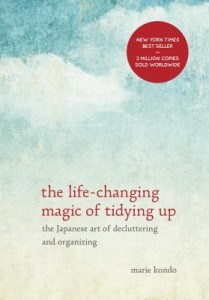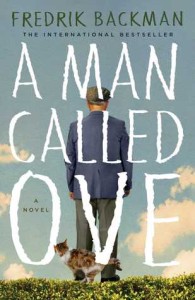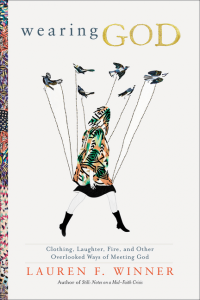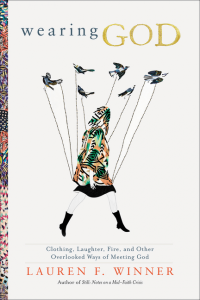 Thanks for joining us for the virtual book club! It’s easy to participate. Just read the book, and then at your own convenience, add your thoughts in the comments section. You can respond to any of these discussion questions—or just say what you thought of the book.
Thanks for joining us for the virtual book club! It’s easy to participate. Just read the book, and then at your own convenience, add your thoughts in the comments section. You can respond to any of these discussion questions—or just say what you thought of the book.
And as a bonus, I’ll give away a free book to one lucky commenter!
***
I have to say that I was a reluctant adopter to read this book. I prefer to read books where the story is the main thing, whether that’s in the form of a novel or a memoir. The problem with self-help books is that they typically require you to do something besides sit in a comfy chair and read. But so many people were talking about this book (many of whom claimed it changed their life, just as the title promises) that I finally caved.
Here’s my take, in a nutshell: The Life-Changing Magic of Tidying Up didn’t change my life, but it did change my closet.
Discussion #1: What is your tolerance for clutter?
The author claims that “tidying up” isn’t just about having fewer belongings or about being organized; it’s about freeing yourself up to become the person you were meant to be.
Keep only those things that speak to your heart. Then take the plunge and discard all the rest. By doing this, you can reset your life and embark on a new lifestyle.
She has a point here—when we have too much stuff, it can certainly bog us down. But I think everyone has a different level of comfort with clutter. Some people enjoy space for a little creative messiness; other people feel peace when their counters are clean and their closets are organized.
Where do you fall on the spectrum? How much clutter is too much for you?
Discussion #2: What tips resonated with you?
I appreciated that this book encouraged some self-reflection not just about what we keep but about why we keep it. As I went through my clothes, I realized my default question is typically “Do I wear this?” not “Does this spark joy?”
When we really delve into the reasons for why we can’t let something go, there are only two: an attachment to the past or a fear for the future.
Serendipitously, I read this book the week after my company changed their dress code to allow jeans. I don’t think I had realized up to this point that dress pants spark zero joy in my life. As I write this, I am happily wearing jeans, and my dress pants are on a rack at Goodwill, hoping to spark joy in a new owner.
Was there something you got rid of after reading this book? How did you feel after you got rid of it? Do you tend to hold on to things because of sentimentality or a desire to prepared?
Discussion #3: What parts of the book didn’t click for you?
While I felt like I could glean insight form the author’s overall principles, some of her specifics were a little on the wonky side for me. She sounds very earnest in her claim that “folding is really a form of dialogue with your wardrobe.” Now I may have conversations with my laundry, but usually it’s a one-sided ordeal with exclamations like “Oh dear, I left you in the washer overnight.”
The part where my blood pressure started rising, however, was the section on books. For all that the author claims that objects have feelings, there is a surprising lack of sensitivity toward my beloved book-friends.
The true purpose [of books] is to be read, to convey the information to their readers.
There is no meaning in their just being on your shelves.
What?! Books aren’t just vehicles of information; they are companions for life! I confess to being rather horrified about her former habit of slicing pages out of books to keep the pages that sparked joy and discard the rest. I did get rid of a few titles that fall into the category of “books I feel like I should read but probably never will,” but that did little to pare down my three stuffed bookshelves.
So what are you sentimental about? For me it’s books, but for you maybe it’s photos, knickknacks, or gifts. What didn’t work for you in the KonMari method?
Rating
I would give this book three stars (out of five).
I’d say it’s worth reading as long as you go into it with the idea that you can personalize these concepts so they make sense for you—for your personality and your home and your unique situation. Weed out the wonky parts (like taping shut the eyes of your stuffed animals before giving them away), and just use what works for you. But if you’re in need of inspiration to declutter, this will give you the spark you need.
How would you rate this book?
***
Remember: I’m giving away a FREE BOOK to one lucky commenter! Just write a comment about the book below to be eligible.

 If I were to pick a handful of words to describe this book, I’d have to go with quirky, endearing, and hopeful. And above all, charming. Which, when you come to think of it, are not exactly the words you might expect for a book that opens with an old man making plans to commit suicide. Despite the premise, this book had some delightfully humorous moments, and I had that pleasant kind of lump in my throat throughout the whole thing. I fell in love with curmudgeonly old Ove, and it was one of those books I couldn’t bear to finish because I wasn’t ready to say goodbye to him yet.
If I were to pick a handful of words to describe this book, I’d have to go with quirky, endearing, and hopeful. And above all, charming. Which, when you come to think of it, are not exactly the words you might expect for a book that opens with an old man making plans to commit suicide. Despite the premise, this book had some delightfully humorous moments, and I had that pleasant kind of lump in my throat throughout the whole thing. I fell in love with curmudgeonly old Ove, and it was one of those books I couldn’t bear to finish because I wasn’t ready to say goodbye to him yet.


